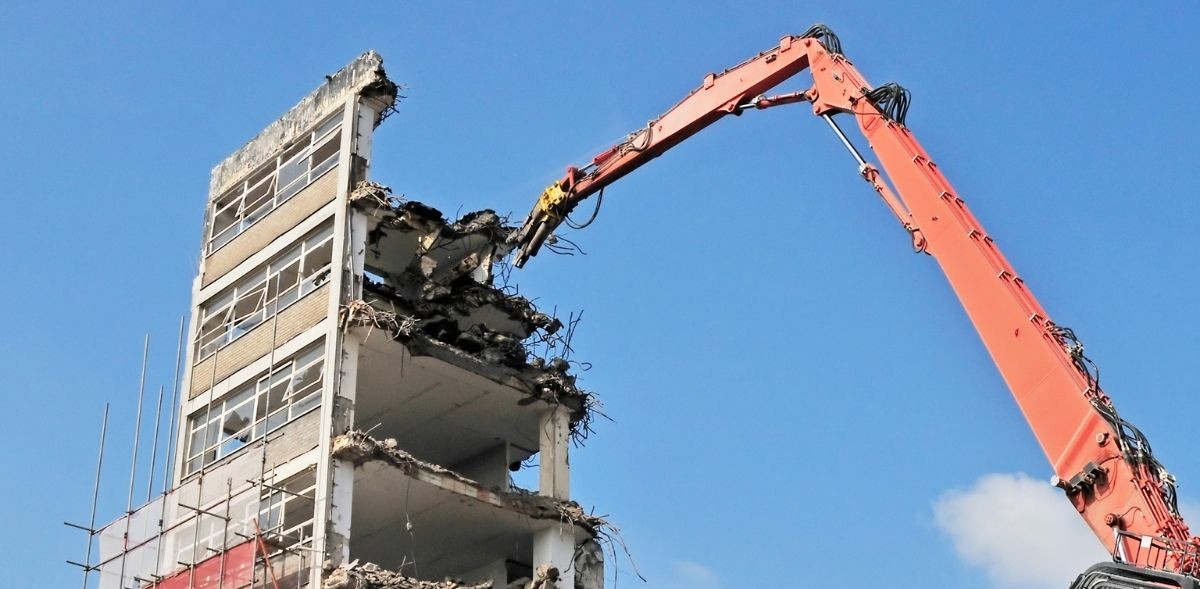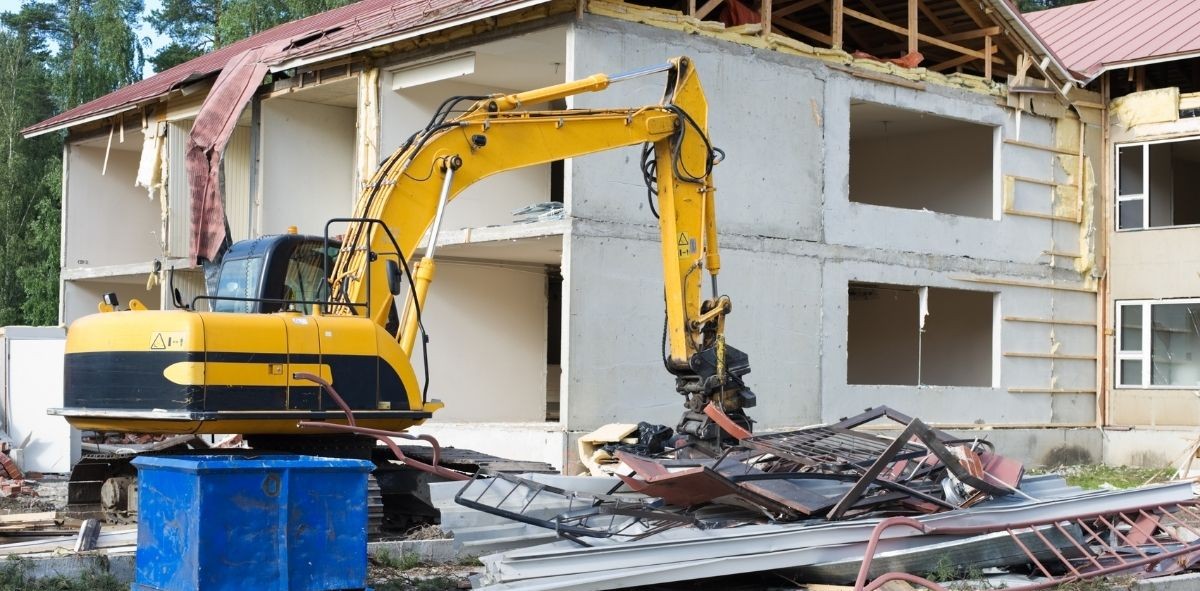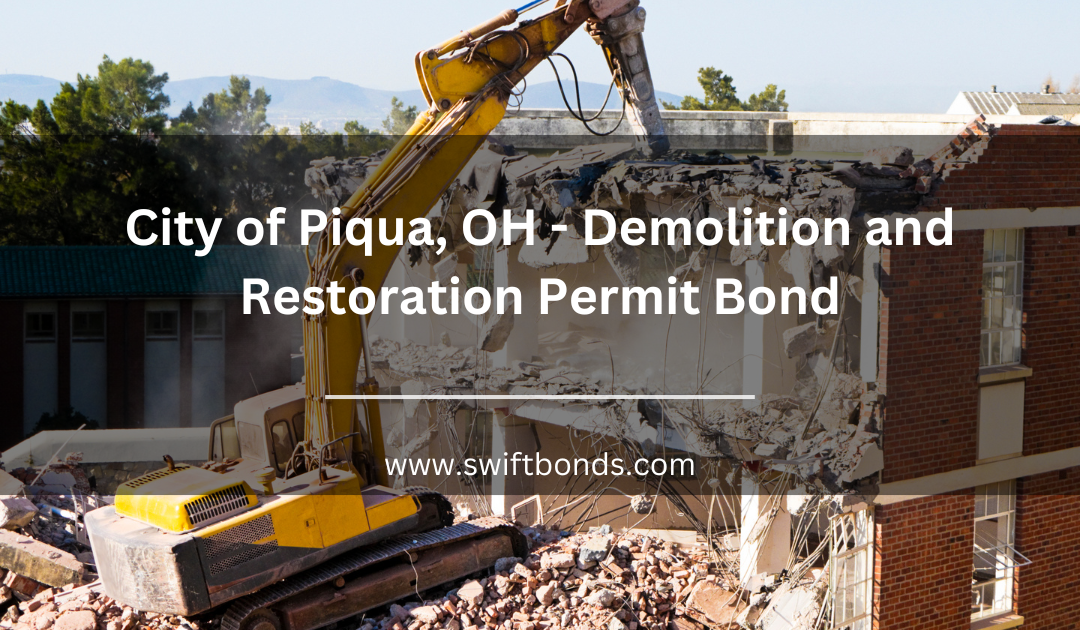Get an Instant Quote on Demolition and Restoration Permit Bond
Introduction
From our perspective, demolition contractors in Piqua understand that tearing something down is only part of the job. The real success lies in how the site is restored once the work is done. Whether it’s clearing an old home, removing commercial structures, or leveling unsafe properties, the City of Piqua requires contractors to protect public spaces and nearby properties through the City of Piqua, OH – Demolition and Restoration Permit Bond.
This bond exists to guarantee that the contractor not only completes the demolition work but restores the property to city standards. It’s a financial promise that sidewalks, curbs, utilities, and other impacted areas will be repaired, filled, or graded properly. If the contractor fails to do so, the City of Piqua can use the bond to cover the cost of restoration.
Contractors familiar with similar municipal obligations—like the City of Canton, OH – House Connection and Special Sewer ($10,000) Bond or the Village of Timberlake, OH – Contractor License ($5,000) Bond—will recognize how bonds reinforce trust between cities and contractors. This bond protects the public, but it also empowers contractors to work legally and efficiently.
Bond Misunderstandings That Stall Demolition Projects
We’ve noticed that demolition contractors frequently assume that insurance policies or building permits alone cover their obligations. This assumption often leads to unexpected permit delays or even job shutdowns. The City of Piqua, OH – Demolition and Restoration Permit Bond is a separate requirement that guarantees site restoration after demolition, not protection against accidents or structural collapse.
Some contractors think the bond is only required for commercial demolitions or larger projects. That’s inaccurate. The City of Piqua enforces this requirement for all qualifying demolition work, including single-family homes, garages, or accessory structures. The value of the bond is based on the city’s standards, and all applicants must file it before receiving a demolition permit.
We’ve also seen confusion from contractors who work across multiple Ohio municipalities. Holding a bond like the Village of Timberlake, OH – Contractor License ($5,000) Bond does not satisfy Piqua’s demolition bond requirement. Each bond applies to a specific location and serves a different legal function. Overlooking this difference leads to project delays, rejected permits, and lost client trust.

Bond Professionals Assisting Piqua Contractors
Based on our experience, Swiftbonds helps demolition professionals meet city-specific bonding rules quickly and correctly. We work with contractors statewide and understand what Piqua expects from those applying for demolition and restoration permits.
The City of Piqua, OH – Demolition and Restoration Permit Bond is not just about removing debris—it’s about leaving the site safe, level, and ready for its next use. We assist contractors in preparing the proper bond form, securing the required amount, and submitting it to the city in time to keep jobs on schedule.
Our team supports contractors across various trades. Whether you’re restoring a property in Piqua, connecting a new lateral sewer line under the City of Canton, OH – House Connection and Special Sewer ($10,000) Bond, or applying for a contractor license in Timberlake, Swiftbonds makes sure you’re covered every step of the way.

Steps to Meet Piqua’s Bond Requirement
What we’ve discovered is that a simple plan can help contractors meet their bond obligation without hiccups. Here’s how to complete the bonding process for demolition in Piqua:
- Review Permit Requirements
Contact the City of Piqua’s Engineering or Building Department to confirm whether your demolition project requires the bond. - Apply for the Bond
Submit your business details to Swiftbonds, including job site location and scope of work. - Get a Quote
Based on your credit and business history, we’ll issue a quote for the bond premium—usually a small fraction of the total bond value. - Pay and Issue the Bond
Once approved, pay the premium and receive your bond documentation. - Submit to the City
File the original bond form with the City of Piqua before your permit is finalized.
If you’ve already worked in cities like Canton or Timberlake, this process will feel familiar. But each city has its own format, and Swiftbonds helps you meet those local expectations precisely.

Early Filing Keeps Projects Moving
We’ve found that contractors who take action early in the permitting process avoid unnecessary delays. The City of Piqua won’t approve a demolition permit until the bond is on file. Starting the bond process only after scheduling equipment or demolition crews often results in project hold-ups and client dissatisfaction.
Whether you’re removing a fire-damaged property or clearing land for new development, the City of Piqua, OH – Demolition and Restoration Permit Bond protects everyone involved. Having it filed ahead of time allows for inspections, timelines, and restoration benchmarks to proceed without last-minute surprises.
In fast-moving projects that overlap with obligations in other municipalities—such as the City of Canton, OH – House Connection and Special Sewer ($10,000) Bond—keeping your bond compliance organized is key to staying profitable and professional.

Noncompliance Risks Work Stoppage and Reputation Damage
In our observation, skipping or overlooking the demolition bond requirement in Piqua can lead to serious problems. Without it, the city has no financial recourse if a contractor leaves a site in poor condition. This can lead to stop-work orders, refusal of future permits, and increased scrutiny during inspections.
Even experienced contractors sometimes assume that bonding is handled during the permit application. But Piqua treats the Demolition and Restoration Permit Bond as a separate condition. Ignoring it may not only stop the project but also jeopardize licensing status or limit your eligibility for future city work.
Those managing obligations in places like Timberlake or Canton already know the risks of noncompliance. Piqua is no exception. Failing to meet bond expectations can undermine years of reliable service and strain relationships with clients and local authorities.
Bond Compliance Builds Confidence and Opportunity
We’ve learned that bonded contractors earn more trust, face fewer regulatory hurdles, and receive faster approvals. Holding the City of Piqua, OH – Demolition and Restoration Permit Bond confirms that you take safety and cleanup seriously. It signals to city officials and property owners that your work doesn’t end with demolition—it ends with responsible restoration.
Swiftbonds makes that message easier to send. We help contractors meet all municipal bonding requirements, from sewer connections in Canton to license obligations in Timberlake. With a streamlined process and clear documentation, we put contractors in the best position to succeed.
Being bonded means more than meeting a rule—it’s about standing out as a professional who’s ready to finish strong.
State Statutes
The City of Piqua enforces its demolition and restoration bond requirement through its municipal permitting and code enforcement processes. These local rules are supported by Ohio Revised Code § 715.26, which allows municipalities to regulate unsafe buildings and require financial guarantees for demolition work.
Contractors working on public improvements or right-of-way restoration should also refer to Ohio Revised Code § 153.54–153.571, the Ohio Little Miller Act. This set of statutes governs performance and payment bonds for public works and often influences how local agencies draft their bonding requirements.
Conclusion
We’ve come to appreciate that the City of Piqua, OH – Demolition and Restoration Permit Bond plays a vital role in maintaining safety and accountability. It guarantees that demolition projects are completed with care, compliance, and follow-through—values that reflect a contractor’s integrity.
Contractors balancing duties across cities like Canton and Timberlake already understand that each location sets its own rules. Swiftbonds helps make those rules clear and achievable. Whether you’re filing for a Village of Timberlake, OH – Contractor License ($5,000) Bond or completing sewer work in Canton, our process gives you the confidence to take on any job—and finish with confidence.
Frequently Asked Questions
What does the City of Piqua, OH – Demolition and Restoration Permit Bond cover?
The bond guarantees that the contractor will restore the demolition site according to city standards, including grading, debris removal, and repair of adjacent public areas.
Does this bond replace my general liability insurance?
No. This bond does not replace insurance. It specifically protects the City of Piqua by covering costs if a contractor fails to restore the site properly.
Can I use a license bond from Timberlake or a sewer bond from Canton to meet this requirement?
No. The Village of Timberlake, OH – Contractor License ($5,000) Bond and the City of Canton, OH – House Connection and Special Sewer ($10,000) Bond are for different purposes and locations. Each city requires its own bond.
How much does the bond cost?
The cost depends on your financial history and credit but is typically a small percentage of the bond amount. Swiftbonds can issue a quote quickly based on your application.
What happens if I don’t file the bond with the city before starting work?
The City of Piqua may deny your permit or issue a stop-work order. Always file the bond before beginning demolition to stay compliant.


